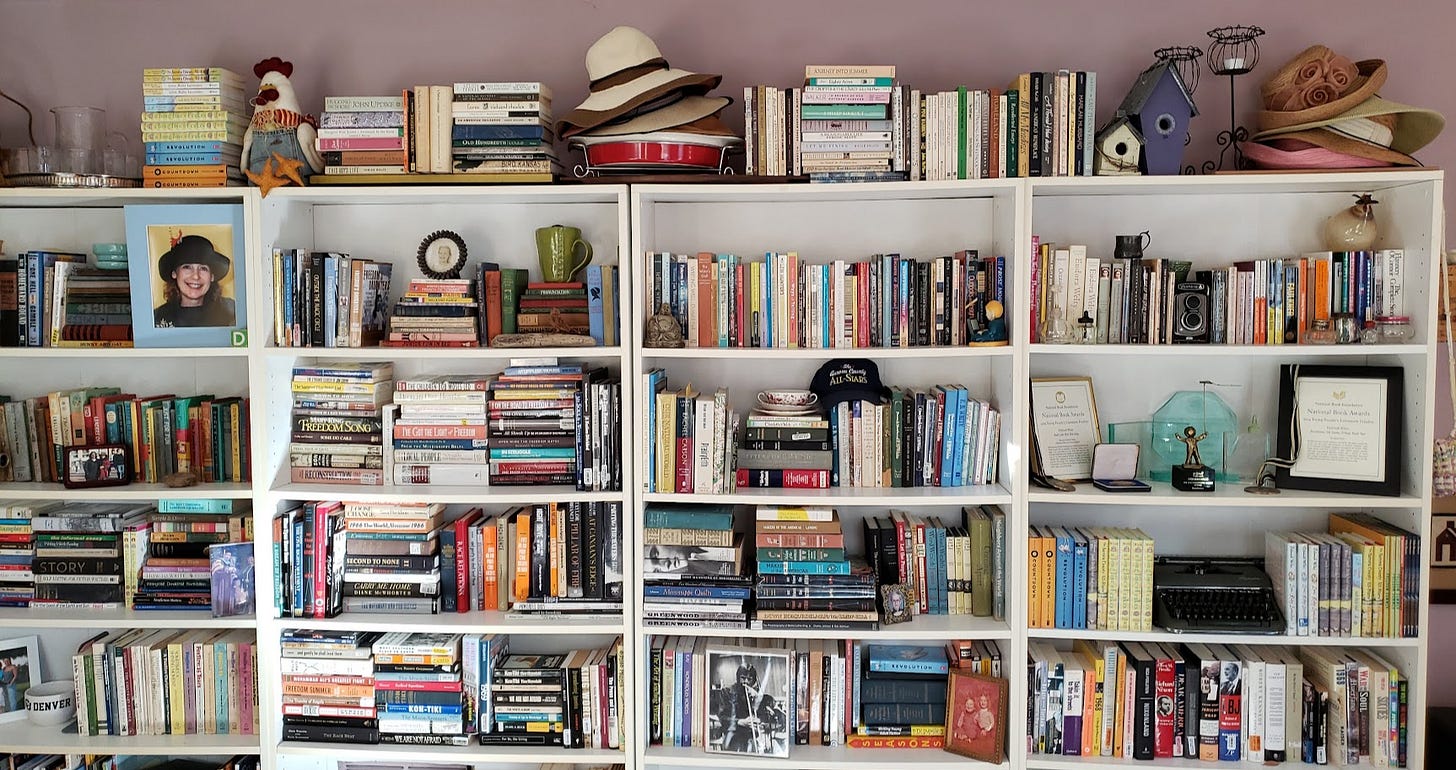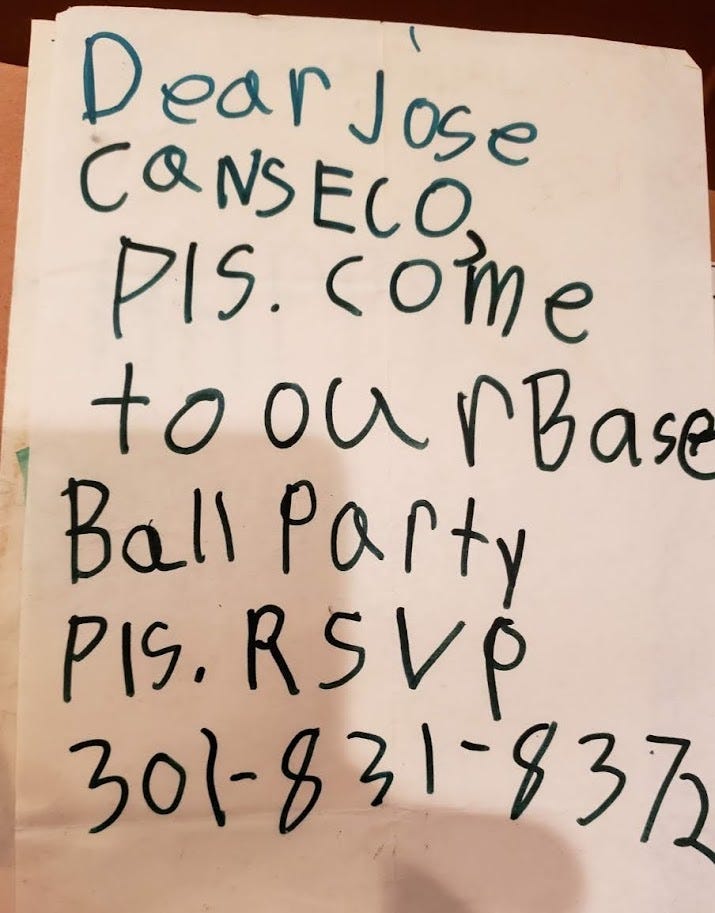{This is the first of two free-to-all posts this week in the Writing Lab section of Storybelly. The Lab is always open to all who want to dive deeper into writing (or teaching writing) with me, with others, and it comes to you every week (in addition to the free Digest) with a monthly or annual subscription to Storybelly… but this week, (except for the Lab Chat, where we are cultivating a safe space for Lab Coats), we are open to all, so y’all can see what we’re up to over here. We’ll open the Lab once a quarter as well, to further entice you to come tell your story, the story only you can write.} Onward:
So, Canons (Not Cannons):
I think a lot about canon and how it develops over time, how it changes us into readers and writers, bakers and gardeners and welders and organizers and farmers; empathizers and criticizers, lovers and haters, thinkers and followers, unique human beings… that’s what story does for us. It shapes us. It empowers us.
That’s why some people are so afraid of it.
But not here in the Lab. We have cake.
(Well, okay, you can be afraid of it, afraid of your own story, or of someone else’s story, but here, in this safe space, all stories are welcome, because we want everyone to feel empowered — authentically empowered — to take up their bed and walk.)
There are canons in literature, music, philosophy, film, art of all kinds, and there are sub-canons within those headings, and lists made by pundits or blowhards, canons of the must-reads or listens or watches that one who wants to be well-read or educated, or working in a certain field, must avail themselves of, but the most important canon, and the one I think about the most, is the one you create yourself… and the one that created you.
Since we’re using the Lab to investigate our personal narratives and find the stories that come from that narrative, from that life we’ve led and bled and suffered and triumphed and laughed and cried and sloshed around in with aplomb, with bitterness, with gratitude, with moxie, in rage, in sorrow, in joy, it makes sense that we think about the books that have made us. What are yours? List a couple in comments, if you will, for all of us to savor, as we get to know one another. I’ll start.

I am surrounded by my canon every day, here in my office and on other bookcases throughout the house — you never know when you’ll need to snag a book from your canon for something you’ve underlined or you want to share it or read it again, or you’ve finished with a book and you’ve put it on its nearest bookcase.
The Sailor Dog by Margaret Wise Brown and Deliverance by James Dickey are the first two canon books I thought of as I started to write this post. I put absolutely no thought behind these choices. They came to me, I caught them.
There are many more I could have chosen, but it turns out — hey! — these two books showcase the variety in my canon, from one pole to another. Both of these books played a part in defining who I am as a writer, an adventurer, a lover of language and story, and someone who wants to “write like that.”
Pick Two:
So I ask you: What are those books for you? Sometimes, just taking the two that pop into your mind first and seeing how they speak to who you’ve become as a reader, a writer, and all the things you are, is an exercise (I need a better word; this is too close to “writing prompt” and I don’t mean that), an exercise in finding an a-ha! moment to write about, One Clear Moment in Time, a concept we’ll visit often in the Lab, because personal narrative turns on it. So does, ultimately, all fiction.
This morning, when Deliverance and Sailor Dog popped into my mind, I went down that road, and as I did, I realized something I knew intrinsically but rarely bring into consciousness: Sailor Dog represents adventuring. So does Deliverance. Very different kinds of adventuring. And boy-howdy have I adventured, both wildly and safely, quietly and crazily… you get the picture.
How have these two books shaped me, as I’ve come into my own? Well… I admit that I need safety within my adventure, and I want comfort (Sailor Dog), but I have a defiant streak and — when pushed, or challenged, or in anger or desperation — I will risk saying or doing something to my detriment (Deliverance), and this was especially true when I was younger.
As I type these thoughts, stories suggest themselves to me — my personal narrative floats before me a story about the mountains of dish towels I stack in my kitchen (which I mentioned in Notes yesterday), and the hapless hope I put in every spring’s planting of yet-another fruit tree that may not make it, and the way that I defied those who said “you’ll never make it, you can’t do it, it’ll never work,” and even “you’re worthless!” but I did that thing anyway, and what did it cost me? A lot. But what did I gain from it? More. Did my choices cause others to suffer as well? Sometimes. What can I do about that?
I have done what I could, and I have learned to stand for myself and — most times — within a place of empathy and relative safety, and I’ve been able to withstand the times of distress without imploding. I can’t always say the same about my characters. Which is a good thing. That’s what makes fiction go ‘round.
Writing Concepts to Explore:
The good news is, I use words on paper (so to speak) to figure out what it all means. I can scribble essays, vignettes, poems, lists — stories — out of each of the memories flooding my mind and heart this morning — quick! where is my notebook so I can capture these moments and then break them down into smaller parts — The Time That — another concept we’ll visit often in the Lab, along with Moments, Memories, and Meaning.
Something else my canon does for me, when it brings up these memories: it makes me feel things I need to feel in order to write about them — What you Know, What you Feel, What you can Imagine — yet another concept we’ll work with in the Lab.
In this case, this morning, thinking about those two books in my canon, I feel comforted, then anxious, then frightened, then delighted (the language in both those books!), then mercurial (whoa!), determined (whew!) and, ultimately, peaceful. Peaceful because I love how the sailor dog found his home; peaceful because I have worked through a lot of what that defiance wrought; and peaceful enough to write about the hard stuff, and I do write about it, in every novel I’ve written.
See Comfort and Declaration’s slap-fight in Each Little Bird That Sings; Melba Jane and Ruby’s on-the-bridge fight (and redemption at the Operetta) in Love, Ruby Lavender; how Sunny pushes away her new step-mother, Annabelle, in Revolution; see all the scrapbooks in the Sixties Trilogy, but especially those in Revolution and Anthem; and see every page of Kent State, for starters.
The Assignment:
What? You thought there wouldn’t be Assignments? Come now! It’s the Lab. We experiment in the Lab. I thought to call the Assignment “the Experiment,” but, nah. You can think of it as an experiment, though, because, at heart, that’s what all writing is. We experiment with hypotheses, variables, observations, cause-and-effect, methods, discussion, in the Lab. So, don your Lab Coat and let’s get to work.
The Assignment will always be optional. You can think about it, write it, share it here in comments, or in the Lab Chat (labelled as “Chat” in the ribbon across the top of the Storybelly home page), which will always be a closed section of Storybelly, open to Lab members (so a paid sub is required, even now in this Lab posts free-to-all week, which keeps us a close, sharing community in the Chat), or you can skip it altogether. Dealer’s choice, as I wrote… somewhere… yesterday.
So…the Assignment:
Think about your canon: in this case, the books that have made you. Pick two. Don’t think too hard about it; don’t think at all. The first two that come to you are the ones you want. Let your subconscious go to work. Grab those books off the shelf, if you have them, or work from memory… or from your feelings. What do those two books have in common, and what did they offer you when you first read them? What do they give you now? How have you used them in shaping your life? Your writing?
There are no wrong answers. You are massaging your memories, which will give you ideas, and all ideas are valid. Write down the titles of those books, and write down what comes to you, even as stream-of-consciousness. You can make a mess in your notebook, in the Lab Chat, here in comments, to share or to keep for yourself.
Also, as I’ve said in writing workshops for years, we recognize all kinds of (mis)spelling, grammar, constructs, abbreviations, shorthand, longhand, neat, messy, slang, and scrawled, heartfelt invitations like the one below. Just get it down and don’t worry about the rest. The rest comes later. I abide by this guideline, myself, you’ll see.
See you again soon, right here. I’ll respond to whatever you post below, in the comments. All are welcome to share and respond. (For current Lab members, I’ll kick off the Writer’s Lab discussion in the Chat.)
Happy Massaging (your memory, that is…insert smiley face here),
Debbie






Two books using the same criteria as you (absolutely no thought behind it) were Hatchet by Gary Paulsen and Rats Saw God by Rob Thomas. One for the survival adventure, and the other as an example of searching for artistic expression (and love). But one of the first books I read where I though I wanted to write "like that" was Into the Wild by Jon Krakauer. I think his style is very compelling.
Finn Family Moomintroll by Tove Jansson and My Family and Other Animals by Gerald Durrell.
The repetition of ‘family’ is all the evidence I need to explain why I loved and still love these books and why, in my own writing for children ( but really, for me) the heart of every story is a family in all its messy glory. Family as the seedbed, the oyster grit, the spark at the start of the fission. Family as the multitalented sculptor that shapes and pummels and carves our pliant childhood clay into the shape we’re in.
And if only I had a tenth of the talent of the mother of Moomins for writing light and shade, for lightness of touch with subjects of planetary heft and for her clear-eyed view of our human hearts…as a lonely little girl, Jansson and Durrell gave me community, validation and a hint of the possibilities ahead in life, in love and in making families of my own.